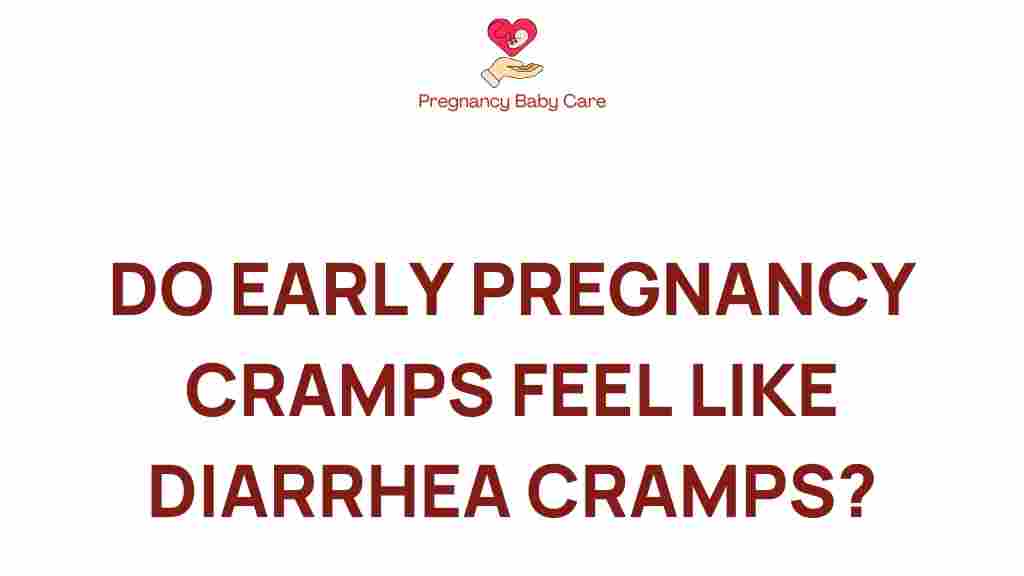Do Early Pregnancy Cramps Mimic Diarrhea Symptoms?
Experiencing cramps during early pregnancy can be concerning for many women. With the body going through numerous changes, it’s common to wonder whether these discomforts are part of the normal pregnancy journey or if they might indicate a more serious issue. One question that often arises is whether early pregnancy cramps can mimic diarrhea symptoms. In this article, we will explore the nature of early pregnancy cramps, how they relate to abdominal pain, and what you need to know about managing pregnancy symptoms, particularly during the first trimester.
Understanding Early Pregnancy Cramps
Early pregnancy cramps are a common experience for many women. They can occur due to various reasons, including:
- Implantation: When the fertilized egg attaches to the uterine lining, it can cause mild cramps.
- Uterine Growth: As the uterus expands to accommodate the growing fetus, stretching can lead to discomfort.
- Hormonal Changes: The surge of hormones during pregnancy can affect the muscles and ligaments in the abdomen.
While these cramps are typically mild and temporary, they can sometimes resemble the discomfort associated with diarrhea cramps. It’s essential to differentiate between these two types of symptoms for better management and understanding.
Diarrhea Cramps: What They Are
Diarrhea cramps are a result of the digestive system reacting to various factors, including:
- Dietary Choices: Foods that are high in fat, dairy, or sugar can lead to digestive upset.
- Infections: Viral or bacterial infections can cause inflammation in the intestines.
- Stress: Emotional stress can manifest physically, leading to gastrointestinal distress.
Unlike early pregnancy cramps, diarrhea cramps are often accompanied by additional symptoms, such as:
- Frequent bowel movements
- Nausea
- Vomiting
- Fever
It’s important to note that while both types of cramps involve abdominal pain, their causes and accompanying symptoms can differ significantly.
How to Differentiate Between Early Pregnancy Cramps and Diarrhea Cramps
When experiencing abdominal pain, it’s crucial to understand the differences between early pregnancy cramps and diarrhea cramps. Here are some key points to consider:
- Timing: Early pregnancy cramps usually occur around the time of missed periods or shortly after conception. Diarrhea cramps can occur at any time due to dietary or health-related issues.
- Duration: Early pregnancy cramps are typically brief and intermittent, while diarrhea cramps may be prolonged and occur in conjunction with other digestive symptoms.
- Accompanying Symptoms: Diarrhea is often accompanied by nausea, vomiting, and changes in bowel habits, whereas early pregnancy cramps might come with symptoms like breast tenderness or fatigue.
Common Pregnancy Symptoms in the First Trimester
The first trimester of pregnancy can be a whirlwind of physical and emotional changes. Common pregnancy symptoms include:
- Missed periods
- Mild cramping
- Nausea or morning sickness
- Fatigue
- Breast tenderness
- Frequent urination
It’s important for women to track these symptoms and communicate any significant changes to their healthcare provider as part of their prenatal care. Regular check-ups can help address any health concerns and ensure a healthy pregnancy.
Health Concerns Related to Early Pregnancy Cramps
While early pregnancy cramps are often normal, certain situations warrant a call to your healthcare provider. These include:
- Severe or persistent abdominal pain
- Heavy bleeding
- Dizziness or fainting
- Signs of infection, such as fever or chills
Recognizing the signs of potential complications can help manage pregnancy discomfort and ensure the safety of both mother and child.
Managing Early Pregnancy Discomfort
Here are some tips for managing early pregnancy discomfort:
- Stay Hydrated: Drinking plenty of water can help alleviate some discomfort.
- Eat a Balanced Diet: Consuming a diet rich in fruits, vegetables, whole grains, and lean proteins can support overall health.
- Gentle Exercise: Light activities, such as walking or prenatal yoga, can help improve circulation and reduce cramping.
- Rest: Ensure you are getting enough sleep and rest to support your body during this time.
When to Seek Professional Help
If you are unsure whether your cramps are related to early pregnancy or if they mimic diarrhea symptoms, it’s crucial to consult with a healthcare professional. They can provide guidance tailored to your specific situation. Don’t hesitate to reach out, especially if you experience:
- Increasing severity of cramps
- Changes in your usual bowel habits
- Unusual discharge or bleeding
Your healthcare provider can help clarify any confusion and offer peace of mind regarding your symptoms.
Conclusion
Understanding the differences between early pregnancy cramps and diarrhea cramps is vital for managing your health during the first trimester. While both can cause discomfort, they stem from different causes and may require different responses. By staying informed about pregnancy symptoms and maintaining open communication with your healthcare provider, you can navigate this exciting yet challenging time with confidence.
For more information on pregnancy discomfort and essential prenatal care tips, visit Women’s Health Resources. Remember, your health and well-being are paramount during this journey.
If you’re interested in learning more about managing early pregnancy symptoms, check out our comprehensive guide here.
This article is in the category Pregnancy and created by PregnancyBabyCare Team
